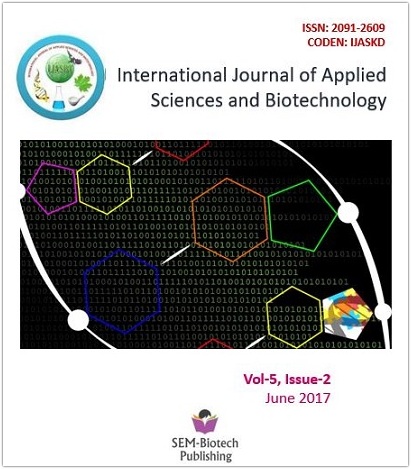Antibacterial Effects of Thuja Leaves Extract
DOI:
https://doi.org/10.3126/ijasbt.v5i2.17617Keywords:
Thuja, Antibacterial effect, Extraction, Minimum inhibitory concentration, oleoresinAbstract
Various medicinal plants are common in use in Nepal for the treatment of different diseases. Nowadays, drug resistance has emerged as a major problem for various infections, in such case plants can be used as alternative for the production of new antimicrobial agents. Thuja (in Nepali: dhupi) is a small evergreen genus of the Cupressaceae family. This species is widely cultivated as a common ornamental plant in Nepal and India. This study examined the antibacterial activity of Thuja leaves extract on gram positive (Staphylococcus aureus and Streptococcus spp.) and gram-negative bacteria (E. coli and Pseudomonas aeruginosa). Thuja leaves were collected from different localities of Dharan, and dried under shade for 10 days. They were then grinded using mechanical grinder. Leaf extract (oleoresin) was obtained by soxhlet extraction technique using mixture of Ethyl acetate, Ethanol and chloroform in the ratio 40:30:30 as the solvent. The antibacterial activity of Thuja oleoresin was tested using both Agar well diffusion as well as disc diffusion technique. Minimum Inhibitory Concentration(MIC) was determined by agar well diffusion on MHA plates. Thuja oleoresin showed distinct antibacterial activity towards all four isolates on both agar well and disc diffusion methods. MIC for Pseudomonas aeruginosa and Streptococcus spp. was found to be 12.5 µl whereas for E. coli and Staphylococcus aureus, MIC was 25 µl. Thus from our results, it is concluded that Thuja leaves have antibacterial effects and can be a potential source for production of antibacterial drugs.
Int. J. Appl. Sci. Biotechnol. Vol 5(2): 256-260




